Centre for Policy Development's Blog, page 67
July 18, 2013
Melbourne Writers’ Festival, Fourth Annual Philanthropy & Ethics Forum | Melbourne, 1 Sept
 The Fourth Annual Philanthropy and Ethics Forum: Mind the Gap
The Fourth Annual Philanthropy and Ethics Forum: Mind the GapDoes philanthropy distort government policy and misdirect resources? Or does it enhance participation and opportunity?
Mary Crooks(Victorian Women’s Trust), Sayajit Das (finance analyst and writer), Miriam Lyons (CPD executive director) and Terry Moran AC (Institute of Public Administration Australia), examine philanthropy’s risks and rewards.
Proudly supported by the Australian Communities Foundation
WHEN
Sunday 1 September, 11.30am
WHERE
Deakin Edge, Fed Square, Corner Swanston Street & Flinders Street, Melbourne 3000
TICKETS
$21.50/$19.50 | Bookings at mwf.com.au or call 03 9999 1199
Melbourne Writers’ Festival | Fourth Annual Philanthropy & Ethics Forum
 The Fourth Annual Philanthropy and Ethics Forum: Mind the Gap
The Fourth Annual Philanthropy and Ethics Forum: Mind the GapDoes philanthropy distort government policy and misdirect resources? Or does it enhance participation and opportunity?
Mary Crooks(Victorian Women’s Trust), Sayajit Das (finance analyst and writer), Miriam Lyons (CPD executive director) and Terry Moran AC (Institute of Public Administration Australia), examine philanthropy’s risks and rewards.
Proudly supported by the Australian Communities Foundation
WHEN
Sunday 1 September, 11.30am
WHERE
Deakin Edge, Fed Square, Corner Swanston Street & Flinders Street, Melbourne 3000
TICKETS
$21.50/$19.50 | Bookings at mwf.com.au or call 03 9999 1199
July 15, 2013
Radio National Outsiders | 14 July 2013
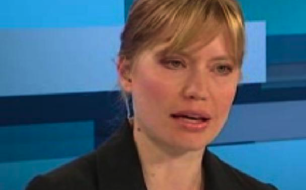
Political campaigns, climate change and Labor reforms.
Jonathan Green hosted a panel comprising CPD’s executive director Miriam Lyons, marketing strategist Toby Ralph and researcher, writer and policy consultant Bronwyn Hinz.
The coalition has launched ads attacking Kevin Rudd’s previous time as PM as part of their new strategy, but is the campaign misleading? Miriam discussed how ‘stimulus’ spending under Rudd helped to prevent recession during the GFC and Bronwyn Hinz pointed out that Rudd’s investment in education is important to most Australians.
Jonathan Green addressed the future of the carbon tax with the announcement that the fixed price will be dropped in favour of a floating emissions trading scheme and invited opinions on the recent Labor reforms.
“With an election date still uncertain, the clock counting down on the states’ adoption of the Better Schools Plan, national party reforms in the pipeline and squabbles over who will win preselection for Julia Gillard’s soon-to-be-vacated seat, the Labor party has its hands full.”
Listen to the audio on Radio National
Change can happen faster than you think – help us seize the moment and point to the alternatives. Add your voice to ours!
July 9, 2013
ABC TV Q&A | 8 July 2013
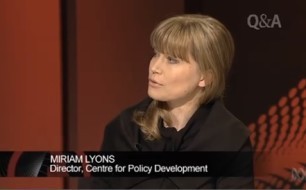
CPD executive director Miriam Lyons weighs in on ABC’s latest Q&A.
Tony Jones hosts Shadow Minister Malcolm Turnbull, the new Deputy Prime Minister Anthony Albanese, writer and comedian Corinne Grant, editorial cartoonist for The Australian newspaper Bill Leak and our own Miriam Lyons for the panel on ABC. They answer questions on the Labor leadership reform, the NBN, emissions trading scheme and why Tony Abbott refuses to debate policy with Kevin Rudd.
Miriam was well received in the Twittersphere during and after the program, where she was hailed as bringing a “breath of fresh air”, being “a voice of reason in the rabble” and “introducing common sense” to the discussion. Also, Miriam was unafraid to refer to the Coalition’s Real Solutions bullkit (sorry, booklet):
“It’s full of superficial slogans. You know, I think that this regulation, you know, we’re going to save a billion dollars by cutting regulation example is great. What regulation are you going to cut: the bank regulation that was so effective in shepherding Australia through difficult economic times where we, you know, ended up suffering from the global financial crisis a lot less because we had a well-regulated sector? Are we going to cut regulation of, say, installing home insulation?”
Watch the episode or read the transcript on the ABC website
Short-term thinking cannot address Australia’s long-term dilemmas – Help us look further ahead!
July 1, 2013
Inside Story | 27 June 2013

Australia could help improve safety, shelter and healthcare through developing regional arrangements
According to CPD Fellow Arja Keski-Nummi, Australia is hardly doing its part when it comes to refugees, with several million in the Asia-Pacific region at the end of 2012, we only host around 30,000 plus around 20,000 with asylum claims. When countries such as Malaysia and Thailand are hosting hundreds of thousands why do our politicians fight to ‘stop the boats’ as if we are in some kind of desperate trouble?
Arja, a former senior immigration official and a co-author of CPD’s Refugee Facts online resource, argues that Australia should lead the way in developing a regional system providing protection and safety, so that a dangerous boat trip no longer seems like the only option.
“We have the chance to develop sensible and realistic policies and should embrace it. If done well, Australia would be assisting in the development of a new and enduring protection framework in the region – sharing the weight and supporting states to build practical and responsive systems to support displaced people in the region.”
Read the article at Inside Story
Access the Refugee Facts website
 Help us fill public debates about refugees and asylum seekers with good ideas; not more fear and misinformation –
Become an Ideas Sustainer.
Help us fill public debates about refugees and asylum seekers with good ideas; not more fear and misinformation –
Become an Ideas Sustainer.
June 26, 2013
3CR Melbourne | Beyond Zero Radio Show
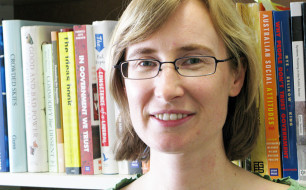 Laura Eadie interviewed for Beyond Zero Emissions (BZE) radio show about think tanks and Going solar
Laura Eadie interviewed for Beyond Zero Emissions (BZE) radio show about think tanks and Going solarWith a strong science and solutions focus, the BZE radio program interviews specialists from around the world, live from 8.30 – 9am, Friday (Aust EST). Guests are specialists in fields such as climate science, renewable energy, energy efficiency, transport, forestry and land use change, climate change politics and policy.
CPD’s research director for its Sustainable economy program answered some tough questions from Matt Grantham and Anthony Daniel, about the Going solar report, the ‘role of think tanks in the community’ and whether the perceived position of a think tank on the political spectrum is the most important factor determining its credibility.
Laura is co-author of the report ‘Going solar: renewing Australia’s electricity options‘, which looks at electricity prices and renewable energy policy, the rapid drop in solar technology costs, and the cost and risks associated with ‘business as usual’.
Going solar looks at the key role rooftop solar will play in our future electricity system, and makes a series of practical policy recommendations to maximise the benefits of rooftop solar while minimising the cost of integrating it into the electricity system.
Access the BZE podcast on the 3CR website or on the BZE website
Read more about, and download the Going solar report
Change can happen faster than you think – help us seize the moment and point to the alternatives. Add your voice to ours!
The Canberra Times | 3 June 2013
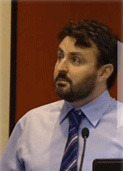 Christopher Stone on Australia’s ‘escape’ from the global financial crisis
Christopher Stone on Australia’s ‘escape’ from the global financial crisisDrawing on his Doing less with less research, CPD research director Christopher Stone discusses what contributed to Australia’s avoiding recession during the global financial crisis. He outlines the importance of the fiscal stimulus package, and what other factors may have contributed to Australia’s success.
“While free-market ideologues continue to offer commentary that dismisses the efficacy of the stimulus package during the GFC and talks of the endless waste of big government, the economic reality is that Australia avoided recession, prevented mass unemployment and has an economy today that is the envy of the developed world – partly because of timely government intervention in a slowing global economy.”
Read the article at The Canberra Times website
Read more about Doing less with less report
Change can happen faster than you think – help us seize the moment and point to the alternatives. Add your voice to ours!
June 25, 2013
Pushing Our Luck: talking policy, not politics
 Ideas for Australian progress
Ideas for Australian progressCPD’s forthcoming book puts forward a compelling, plain-English case for solutions to problems awaiting Australia’s next government, with insights from experts on ten big issues that will shape this country well beyond the 2013 election. We hope Pushing Our luck will revive your zest for public debate, and give us all a chance to set the daily grind of modern politics aside for a moment and focus on what really matters for Australia’s future.
Email your details to pushingourluck@cpd.org.au to reserve your copy
Help CPD publish this important book!
Edited by CPD’s Miriam Lyons, Pushing Our Luck has chapters on 10 key policy areas, by some of Australia’s leading progressive thinkers:
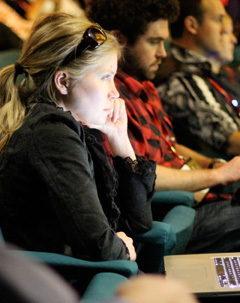
Chris Bonnor & Jane Caro – ‘Getting past Gonski: equality in education’
We’ve created a school system that rewards the children of wealthy and educated parents and punishes kids from less privileged backgrounds. Two thirds of the achievement of kids at an Australian school can be explained by the economic and social background of its students. The reforms sparked by the Gonski Review could go some of the way towards fixing this situation, but more needs to be done. In this chapter Chris Bonnor and Jane Caro show how Australian schooling has been turned into a winner-takes-all competition, and what we can do about it.
Ian McAuley – ‘Life after luck: our economic future’
Ian McAuley looks at how Australia survived the GFC, and how we need to adapt in order to navigate impending hurdles. We can strengthen our economy by restoring our tax base, investing heavily in education and putting in the hard yards to improve public infrastructure.
Geoff Gallop – ‘The vision thing: we need a national strategy’
A national plan for Australia would bring purpose to the way we are governed and help citizens to hold both the elected and non-elected arms of government to account. Former WA Premier Geoff Gallop argues that the focus on politics over policy has made governments reluctant to put long term policy strategies in place or to publicly state their long-term ambitions. A national plan would outline the government’s beliefs and wishes, clarify its objectives and how they can be achieved. It would help both politicians and citizens to move beyond ‘gotcha’ politics and focus on the future.
Eva Cox – ‘Putting people first: welfare that values wellbeing’
This chapter outlines the importance of the social fabric which makes life worthwhile, and how a good welfare system can support this. Eva Cox argues that our current welfare system has abandoned its original purpose – holding society together in the face of economic turmoil. It also fails to adequately value people’s non-monetary contributions such as caring, support and parenting. A modern welfare system should treat recipients with respect instead of coercion, recognise their contributions to society beyond paid work, and face up to the realities of a volatile labor market in which jobseekers without qualifications vastly outnumber the low-skilled jobs available.
John Wiseman – ‘Lead the way or lose the lot: meeting Australia’s climate obligations’
Although one country alone cannot tip the balance on climate change, Australia is in a position to take a global leadership role. John Wiseman outlines a range of compelling reasons to take more rapid action to reduce carbon emissions, from our moral obligations on the world stage, to geographic self-interest, international alliances, health benefits and economic development opportunities.
Roy Green – ‘Managing up: where will growth come from, after the boom?’
Where will jobs and growth come from after the mining boom? Roy discusses Australia’s urgent need to examine our productivity, looking at the risks and rewards of choosing the ‘low road’ of instant fixes and cost-cutting, or the ‘high road’ of long-term investment and industry reforms.
Lindy Edwards – ‘Welcome home: preventing the next culture war’
Deepening economic divides are putting the social cohesion of Australian society at risk. Previous immigration policies ‘White Australia’, assimilation and multiculturalism have all struggled to strike a fair bargain between migrants and the rest of society. Lindy argues that reinvigorating Australia’s ‘founding myth of Federation’ could provide the basis for a national identity that is both uniquely Australian and able to embrace newcomers seeking a better life.
Lisa Heap – ‘What works for workers: addressing insecure employment’
Australia’s workplace laws have not adapted to changes in working practices and continue to focus on the standard, male, full-time employee, but there has been rapid, recent growth in the use of casual workers and independent contractors. Without legal recognition, many non-standard workers are left unprotected. Lisa offers a number of solutions to protect insecure workers.
Shaun Wilson, Adam Stebbing, Adrian March and Miriam Lyons – ‘Whose shout? Paying for a good society’
Our authors explore the importance of taxation, and its potential for reducing social inequity and improving social mobility. Australian attitudes to tax rises are examined, and the question is posed: ‘do we need to embrace the idea of increasing taxation?
Jennifer Doggett – ‘Getting better: Prescriptions for a holistic health system’
To provide adequate healthcare services for all citizens major structural changes are necessary. Jennifer Doggett identifies the prevention and management of chronic diseases as the most important health issue in Australia, arguing that more community input, increased funding and greater accountability could create a ‘best-case scenario’ for healthcare.
Reserve your copy of the book by emailing your details to pushingourluck@cpd.org.au today!
Pushing our luck: talking policy, not politics
 Ideas for Australian progress…
Ideas for Australian progress… CPD’s election 2013 book puts forward a compelling, plain-English case for solutions to some of the key policy problems awaiting Australia’s next government, with insights from experts and critical thinkers across a range of fields from education to economy; climate change to cultural diversity. We hope Pushing our luck will revive your zest for policy debate, and get us all back on topic when it comes to what really matters to Australians right now.
Email your details to pushingourluck@cpd.org.au to reserve your copy
1. Shaun Wilson, Adam Stebbing, Adrian March and Miriam Lyons – ‘Whose shout? Paying for a good society’
Our authors explore the importance of taxation, and its potential for reducing social inequity and improving social mobility. Australian attitudes to tax rises are examined, and the question is posed: ‘do we need to embrace the idea of increasing taxation?’.
2. Ian McAuley – ‘Life after luck: our economic future’
Ian looks at how Australia survived the GFC, and how we need to adapt in order to navigate impending hurdles. Ian looks at diversifying our economy by strengthening our tax base, investing heavily in education and putting in the hard yards to improve public infrastructure.
3. Chris Bonnor & Jane Caro – ‘Getting past Gonski: equality in education’
Two thirds of student achievement is derived from socio-educational status. Thus our education system has been divided into a competitive, tiered system of winners and losers, where high socio-educational schools score highly and draw both students and funding accordingly. In light of the Gonski Review, Chris and Jane endorse directing funding away from schools whose students’ parents have high-contribution capacity and towards disadvantaged schools.
4. John Wiseman – ‘Lead the way or lose the lot: meeting Australia’s climate obligations’
Although one country alone cannot tip the balance on climate change, Australia is in a position to take a global leadership role. John outlines a range of compelling reasons to take action on reducing carbon emissions, from our moral obligations on the world stage, to geographic self-interest, international alliances, health benefits and economic development opportunities.
5. Roy Green – ‘Managing up: where will growth come from, after the boom?’
Where will jobs and growth come from after the mining boom? Roy discusses Australia’s urgent need to examine our productivity, looking at the risks and rewards of choosing the ‘low road’ of instant fixes and cost-cutting, or the ‘high road’ of long-term investment and industry reforms.
6. Lindy Edwards – ‘Welcome home: preventing the next culture war’
Deepening economic divides are putting the social cohesion of Australian society at risk. Previous immigration policies ‘White Australia’, assimilation and multiculturalism have all struggled to strike a fair bargain between migrants and mainstream society. Lindy argues that reinvigorating Australia’s ‘founding myth of Federation’ could provide the basis for a national identity that is both uniquely Australian and able to embrace newcomers seeking a better life.
7. Lisa Heap – ‘What works for workers: addressing insecure employment’
Australia’s workplace laws have not adapted to changes in working practices and continue to focus on the standard, male, full-time employee, but there has been rapid, recent growth in the use of casual workers and independent contractors. Without legal recognition, many non-standard workers are left unprotected. Lisa offers a number of solutions to protect insecure workers.
8. Geoff Gallop – ‘The vision thing: we need a national strategy’
A national plan for government would bring purpose to the way we are governed and an extra layer of accountability to both elected and non-elected arms of government. Former WA Premier Geoff suggests that the focus on politics over policy has led to a reluctance to lock in policy strategy and objectives. A national plan would outline the government’s beliefs and wishes, clarifying its objectives and how they can be achieved.
9. Jennifer Doggett – ‘Getting better: Prescriptions for a holistic health system’
To provide adequate healthcare services for all citizens major structural changes are necessary. Jennifer identifies the prevention and management of chronic diseases as the most important health issue in Australia, arguing that more community input, increased funding and greater accountability could create a ‘best-case scenario’ for healthcare.
10. Eva Cox – ‘Putting society/people first: welfare which values wellbeing’
This chapter outlines the importance of the non-financial social fabric which makes life worthwhile, and how a good welfare system supports this. The current welfare system is based on a neoliberal market-based model, and as such only recognises the economic value of recipients. A more effective welfare system would recognise non-monetary contributions such as caring, support and parenting, treat welfare recipients with respect and ‘revalue’ skills to remove gender bias.
Reserve your copy of the book by emailing your details to pushingourluck@cpd.org.au today!
June 24, 2013
NSW Nurses and Midwives’ Association | Parramatta, 7 August
Professional Day at the 2013 NSWNMA annual conference
CPD Research Director Christopher Stone will speak at this year’s Professional Day on his report Decoding efficiency, which looks at how the term ‘efficiency’ has been defined, used and misused in the context of public services.
WHERE
Rosehill Gardens, James Ruse Drive, Rosehill (near Parramatta)
WHEN
Wednesday, 7 August, 2013. 9am – 5pm. Registration from 7am

CONTACT
NSWNMA on 8595 2181 (metro) or 1300 367 962 (rural).
ADMISSION:
NSWNMA members $50, Branch officials and students: free of charge, Non-members $100
Read more on Decoding Efficiency
 Help us counter evidence-free attempts to downsize and privatise our public services –
Become an Ideas Sustainer!
Help us counter evidence-free attempts to downsize and privatise our public services –
Become an Ideas Sustainer!
Centre for Policy Development's Blog
- Centre for Policy Development's profile
- 1 follower



